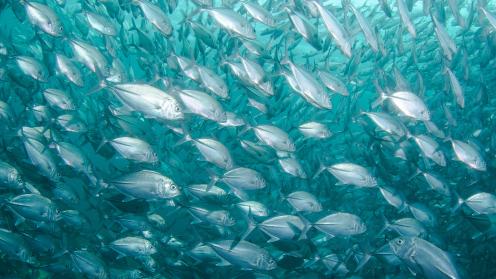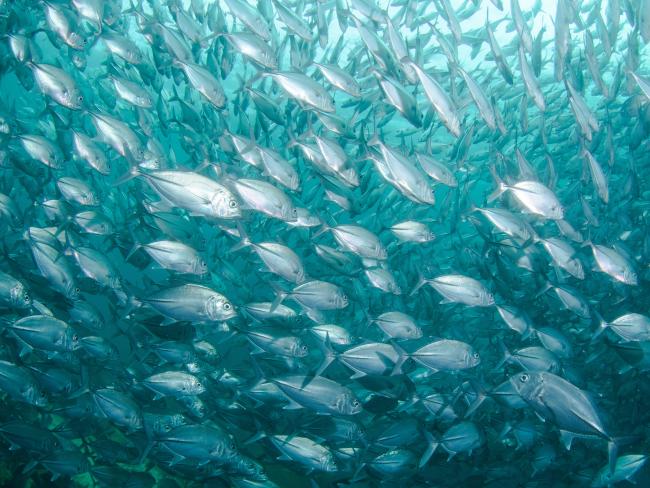About
Many highlighted progress on strengthening the ecosystem approach, addressing illegal, unreported, and unregulated fishing, preserving deep-sea ecosystems, and promoting coordination between Regional Fisheries Management Organizations. But there was no consensus to reference the Agreement on the conservation and sustainable use of biodiversity of areas beyond national jurisdiction (BBNJ) and the Kunming-Montreal Global Biodiversity Framework.
Final report
Summary report 22–26 May 2023
All coverage
Highly migratory fish stocks, such as tuna, swordfish, and sharks travel long distances in areas under and beyond national jurisdiction, while also straddling stocks, such as cod, pollock, jack mackerel, and squid can be found both in UN Member States’ exclusive economic zones and in the high seas. The conservation and management of such stocks must be based on the precautionary approach and best available scientific evidence, according to the Agreement for the Implementation of the Provisions of the UN Convention on the Law of the Sea (UNCLOS) 1982 relating to the Conservation and Management of Straddling Fish Stocks and Highly Migratory Fish Stocks, also known as the UN Fish Stocks Agreement (UNFSA).
The UNFSA was adopted in 1995, entered into force in 2001, and currently has 92 parties. Its aim is to ensure the long-term conservation and sustainable use of straddling and highly migratory fish stocks. It establishes a set of rights and obligations for states to conserve and manage fish stocks that undertake ocean migrations and have wide geographic distributions, as well as associated and dependent species, and to protect the marine environment.
Pursuant to UNFSA Article 36 (review conference), four years after the date of entry into force, in May 2006, the UN Secretary-General convened a Review Conference with a view to assessing the effectiveness of the Agreement. The mandate of the conference was to review and assess the adequacy of the Agreement’s provisions and, if necessary, propose means of strengthening the substance and methods of implementation. The Review Conference was subsequently resumed in May 2010 and May 2016.
The 2023 Resumed Review Conference took place as the Agreement under UNCLOS on the conservation and sustainable use of marine biological biodiversity in areas beyond national jurisdiction (BBNJ Agreement) was being concluded, following lengthy negotiations. UNFSA’s experience on fisheries governance is expected to play an even more important role towards holistic ocean management.
The main task at hand for the meeting was to assess the effectiveness of the Agreement in securing the conservation and management of straddling fish stocks and highly migratory fish stocks, reviewing the implementation of recommendations related to:
- the conservation and management of stocks;
- mechanisms for international cooperation and non-members;
- monitoring, control, and surveillance, and compliance and enforcement; and
- developing states and non-parties.
Delegates focused on means of further strengthening, if necessary, the substance and methods of implementation. In addition, the meeting heard reports from the 14th–16th rounds of informal consultations of parties to the Agreement as well as a report on the status of the Assistance Fund, which was established to assist developing states in the implementation of the Agreement.
The UNFSA Resumed Review Conference took place at UN Headquarters in New York from 22-26 May 2023.
The Earth Negotiations Bulletin provided daily coverage and a summary and analysis from the Resumed Review Conference, beginning on 22 May 2023.
View past and future events
Past event
1st Session of the FSA
Past event
1993 Year-end Update on FSA
Past event
2nd Session of the FSA
Past event
3rd Session of the FSA
Past event
1994 Year-end Update on FSA
Past event
4th Session of the FSA
Past event
5th Session of the FSA
Past event
1995 Year-end Update on FSA
Past event
UN Fish Stocks Agreement Review Conference
Past event
7th Round of Informal Consultations of States Parties to the UNFSA
Past event
8th Round of Informal Consultations of States Parties to the UNFSA
Past event
Resumed UNFSA Review Conference
Past event
Resumed UNFSA Review Conference
Past event
Resumed Review Conference on the UN Fish Stocks Agreement
To receive free coverage of global environmental events delivered to your inbox, subscribe to the ENB Update newsletter.

